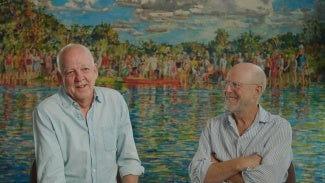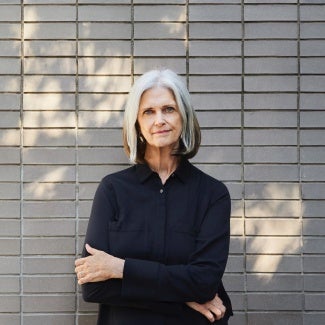David Lake, FAIA, & Ted Flato, FAIA
David Lake, FAIA, and Ted Flato, FAIA are the 2024 winners of the AIA Gold Medal. The duo has repeatedly distinguished themselves as preeminent architects and fearless advocates, pushing the limits of design while easing the burden on our planet.

David Lake, FAIA, and Ted Flato, FAIA
For David Lake, FAIA, and Ted Flato, FAIA, it all began with ranch houses, the ubiquitous structures scattered across Texas that are studies in achieving more with less. From the beginning of their 40-year partnership, which has been marked by ingenuity and an unending pursuit of design as an instrument to advance the greater good, the duo has repeatedly distinguished themselves as preeminent architects and fearless advocates. Equally comfortable leading their inspiring design practice, the San Antonio-based Lake|Flato, and addressing controversial environmental and socio-political issues, both architects push the limits of design while easing the burden on our planet.
Through the confluence of nature, beauty, and resilience, Lake and Flato have made sustainability exciting in a way few other architects have accomplished. The projects they envision have raised the collective consciousness surrounding our climate crisis while simultaneously captivating a broad audience with buildings that are both beautiful and sustainable. While Texas, a region grappling with unprecedented growth and climate change, seems an unlikely place for a firm focused on sustainability to thrive, they have nevertheless helped clients see architecture and sustainability as inextricably linked.
Lake and Flato have received lifetime achievement awards from around the world, including recognition as national academicians from the National Academy of Design and induction into the Design Hall of Fame. Their firm’s work has also been celebrated with more than 300 awards and has been captured in five monographs. But among those achievements, the pair considers their industry-leading 15 COTE Top Ten awards as their most revered. Those projects represent achievement across a broad range of scales and markets, including nature centers, STEM buildings, and mixed-use urban developments.
Their enduring commitment to biophilic design and the well-being of humans is clearly evident in projects like the Josey Pavilion, the first Living Building Challenge-certified project in Texas. The project, in Decatur, Texas, functions as a demonstration site for the Dixon Water Foundation, a nonprofit dedicated to promoting healthy watersheds through sustainable land management. The pavilion mitigates the detrimental effects of stormwater and wastewater through a constructed wetland.
“Architects Ted Flato and David Lake posit that a connection to beautiful architecture can lead to caring and a desire to preserve and conserve one’s surroundings,” noted the Wall Street Journal when it named that pavilion among the best architecture of 2015. “This low-key, elegant building makes a case that it could truly be so.”
Every day, nearly 19,000 customers shop at eight different Lake|Flato-designed H-E-B grocery stores in Texas and Mexico, where, through collaboration with the Rocky Mountain Institute to address the grocer’s supply chain, the firm has implemented sustainable initiatives that lower both customer costs and the stores’ carbon footprint. H-E-B quickly emerged as the benchmark for resiliency in a big-box store. More recently, in Ocean Springs, Mississippi, Lake|Flato designed the Marine Education Center, also a COTE Top Ten recipient, to replace a former facility that was destroyed by Hurricane Katrina in August 2005. The new center highlights sustainable coastal building techniques that exist in harmony with the surrounding marine environment. The center’s entire campus is naturally resilient, a case study in using and maintaining land to serve as a first line of defense.
The renewal of existing buildings is also a critical element of Lake|Flato’s practice, and the firm has repurposed more than 3 million square feet of space into multifamily housing, hotels, and offices. It transformed a 1950s-era paper company’s warehouse into a LEED Gold-certified headquarters for the Livestrong Foundation and reenvisioned a sterile and inefficient clinic into a welcoming and clearly organized facility for students at Arizona State University. The clinic’s biophilic design enhances users’ sense of health and wellness and also encourages the adoption of healthy lifestyles.
Throughout all of their groundbreaking work, Lake and Flato have ensured their buildings sit lightly on the land and nurture the life that interacts with them. Their process, collaborations, and tireless environmental advocacy have directly preserved access to more than 50,000 acres of land in Texas, where less than 4% of land is publicly available, and conserved 35,000 acres of habitats stretching from West Virginia to Florida’s Everglades.
“David Lake and Ted Flato have done more to change the outcome of the human story through their inclusive design process than any other architect or practice,” wrote Bob Berkebile, FAIA, in a letter nominating the duo for the Gold Medal. “Across the country, their buildings are wonderful, but ultimately it is their ability to craft sustainable, high-performance buildings and inclusive places welcoming for both the public and our fellow design professionals that is their true legacy, a legacy deserving of the Gold Medal.”
The AIA Board of Directors and Strategic Council select the winners for this program. The finalists were selected by the following advisory jurors.
Advisory Jury 2024
Anne Hicks Harney, FAIA, Chair, Long Green Specs, Manasquan, NJ
Kjell Anderson, FAIA, LMN Architects, Seattle
Ung-Joo Scott Lee, AIA, Morphosis Architects, New York City
Amy Slattery, AIA, Odimo, Kansas City, Mo.
Megumi Tamanaha, AIA, ARO, New York City
Roderic Walton, AIA, Moody Nolan, Chicago
Korey White, AIA, DLR Group, Quincy, Ill.
Taryn Williams, SGH, Washington, D.C.
The Gold Medal is AIA’s highest annual honor, recognizing individuals whose work has had a lasting influence on the theory and practice of architecture.
The AIA Framework for Design Excellence is based on 10 principles all designers can use to promote a zero-carbon, equitable, resilient, and healthy built environment.












